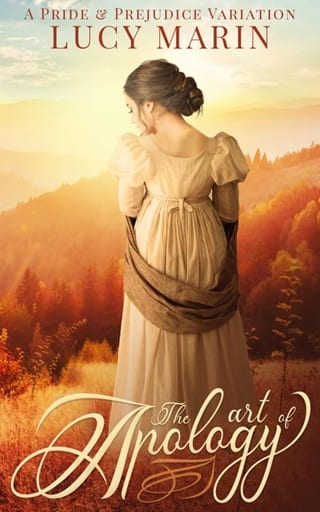Chapter 2
CHAPTER TWO
D arcy was in his apartment reading when he was informed that he had a caller. He considered refusing to see whoever it was. The name he was told—Mr Bennet of Longbourn—meant nothing to him. There must be some mistake; surely the man wanted Bingley, not him.
Or he had heard of Darcy’s wealth, and that was his motivation in coming. What will it be today? An excellent investment opportunity, perhaps property in the neighbourhood I should want for some nonsensical reason? No, I suspect it is the usual—a daughter, a sister, a niece…some girl I am sure to fall madly in love with. How does my income and knowledge of my estate always end up circulating so quickly? I do not speak of it. He was sick of how jealous people became of his wealth, how that was what they valued in him.
Sighing, Darcy closed his book and set it aside. It was not particularly engaging, and he might as well see this Mr Bennet. It would be better to make it known at once that he was only in the neighbourhood for a short while, and he had no intention of making friends or buying anything beyond a few small items—if the Meryton shops had anything to tempt him—and he certainly would not be falling in love with some country miss of no importance. Afterwards, he would take a long ride. The exercise would be welcome, and although he had intended to go out with Bingley later, his friend’s meeting with the estate’s steward was lasting far longer than he had anticipated. Darcy needed to do something active; he was not accustomed to sitting around all day like an old man. Or as Hurst did; he apparently had no interests beyond napping, eating, playing cards, and participating in sport. What an awful life that would be! Then again, he mused, was it so different from how many ladies spent their time, if one substituted sewing or some other feminine art for sport?
Moments later, Darcy entered the drawing room to find an older gentleman awaiting him; from the quality of his attire, he was neither poor nor especially wealthy. The man paced in a straight line in front of the windows, his head bent and hands clasped behind his back. Darcy assumed he was Mr Bennet; he certainly hoped a second man had not come to importune him. He cleared his throat to signal he was present, causing the other man to cease walking and face him.
“Mr Darcy, I presume?”
Darcy nodded. “If it is Mr Bingley you wished to see, you will have to return tomorrow. I might convey a message, if you like.”
“Rupert Bennet of Longbourn,” he said, a sharp edge to his tone that Darcy did not care to be curious about. “My business is with you, sir.”
Darcy inwardly sighed and again reviewed the possible explanations for Mr Bennet’s call. Because he expected it to be one of the usual reasons, despite the man’s abrupt manner, Darcy was shocked by what Mr Bennet said next.
“How came you to insult a lady in a public place? Were you not bothered that you might be overheard by her and our neighbours, which, by the bye, you were ?”
Interesting, Darcy thought, only just recognising Mr Bennet’s anger. His deep scowl alone must be an indication that he had a connexion to the lady Darcy had apparently dismissed. He never said what he did not believe, and if he had disparaged someone, they had deserved it. Mr Bennet must be referring to the assembly, as Darcy had only arrived yesterday, but he had no recollection of doing such a thing. There had been no one present worth knowing apart from Bingley and his family—and Darcy was not entirely sure he would include Hurst.
“I am afraid you have puzzled me. What is it you believe I have done?” Darcy said, doing his best to make his disinterest unmistakable. He would not apologise for speaking the truth—if he had indeed shared his opinion aloud—and he wanted the neighbourhood to understand he had no intention of knowing them on more than a superficial level. He was in Hertfordshire for a few weeks or a month to assist Bingley; as soon as he could, he would return to his family and the handful of people beyond them whom he trusted .
Mr Bennet shook his head as though in disbelief. “You insulted my daughter, Miss Elizabeth Bennet. Within her hearing, and that of many others, you told Mr Bingley she was not pretty and refused to be introduced to her.”
Darcy’s eyes flickered about the room as he tried to grasp the edges of a memory. Then he could picture it. A young lady wearing a gown with violet flowers. Shiny, rich brown hair and fair, smooth skin. She was tall for a lady, perhaps a little taller than his sister, and slender. When Bingley had come to coax him into dancing, Darcy had caught her glancing at them. He had spoken deliberately, wanting to issue a set-down to ensure she understood he found her entirely insipid. Bingley was free to flirt with whomever he liked, but Darcy would do nothing that a lady or her relations might believe indicated a romantic interest or obligation from him. That meant not seeking introductions or asking ladies to dance—not in such a place. It was different in London, when he was amongst the ton and there were other wealthy gentlemen about. Few, if any, gentlemen of his quality would ever visit this small, unfashionable town. To these feelings was added the fact that he detested dancing. He had only asked Mrs Hurst and Miss Bingley because they expected it of him.
Darcy also remembered the way Miss Elizabeth had met his eye after he had spoken, her expression shocked and then amused. He had watched her walk across the room to a woman whom he recalled being introduced to, Miss Lucas, and had continued to study her as the two ladies spoke .
Mr Bennet’s voice recalled him to the present. “You insulted my daughter in a crowded room. You were overheard. It is bad enough that she had to listen to you dismiss her. You had no cause to think ill of her. You had not even been introduced! To make the situation worse, causing her yet greater distress, others heard you as well. My dear girl, who is but twenty years old, had to tolerate—a word you are quick to throw about—our neighbours wanting to discuss your vile statements with her all night. No doubt they are speaking of it amongst themselves today and will continue to do so for some time. Do you make it a practice to damage the reputations of young ladies you do not know for no reason other than— Actually, I fail to see why you would, unless it is for your own amusement.”
Darcy’s cheeks warmed slightly. If pressed, he might concede that yes, he knew it was poor manners to attend an assembly and not dance. Further, he might have confined his remarks to telling Bingley to return to his partner, leaving him to disregard everyone other than his friends. There was nothing wrong with his sentiments—he was allowed to think what he liked—or his desire not to feign friendship or even curiosity about any of the local people, but holding his tongue might have been more prudent.
Hoping to end the discussion and send Mr Bennet on his way immediately, he said, “I regret she overheard what was a private exchange between me and Mr Bingley.” He refrained from adding that Miss Elizabeth ought not to have eavesdropped and had not seemed disturbed by it while she and Miss Lucas had discussed the brief, forgettable moment. Darcy had presumed that he was the cause of their glee as they glanced at him and smiled at each other. Something in the sound of Miss Elizabeth’s laugh had drawn his attention, making it difficult to look away.
Mr Bennet gave a bark of incredulity as though he found Darcy amusing. “I am not owed an apology, sir. My daughter is. And I hope for your sake you take the time to consider your words carefully before you approach her to give it.”
With that, the man spun about and marched out of the room. After spending a minute reflecting on Mr Bennet’s rudeness—both in coming to him like this and leaving as he had—Darcy made his way into the gardens. He would still like to go for a ride, but he had an immediate need for fresh air. He strode along a path, his pace quick and mind racing. What had Mr Bennet meant by his final statement? First, he evidently had supposed that Darcy would issue an apology to Miss Elizabeth directly, and second, he had suggested she would…what exactly? Although Darcy had seen no sign of discomfort in her, perhaps she was one of those ladies who wept at the slightest mishap. If he did speak to her—and he was by no means resolved that he would—and she cried, he would… Well, he did not know what he would do, but he would not take it kindly, and it would sink his opinion of her even lower. What would be resolved under those circumstances? Not that there was anything to resolve.
He exhaled sharply and, seeing a wooden bench beneath a nearby oak tree, he sat and contemplated the estate. Bingley was pleased with Netherfield Park, and Darcy hoped he would be happy here. Months earlier, his friend had asked for his help in finding a property in Hertfordshire. Naturally, Darcy had obliged him, and of the few that were available for lease, this had been the most promising. It would be better if the neighbourhood boasted more noteworthy families, but Bingley likely would not remain for more than a few months. If he decided to reside at Netherfield for longer than a year, Darcy would offer him the benefit of his own experience. It was necessary to have some connexions with one’s neighbours—especially other gentlemen—but that did not require spending large amounts of time with them. Being too friendly, which Bingley often was, could lead to speculation that you meant to marry a young lady from the area and—when you did not—injured feelings were sure to follow.
For the next few minutes, Darcy did nothing more than take in the view. Slowly, his earlier question of whether he had made the wrong choice in how he had responded to Bingley’s coaxing the previous night turned into certainty that he had.
“I should have remained silent. Nothing good could come from speaking my thoughts aloud. Surely there were other ways to ensure people understood I am not interested in knowing them, and I ought to have simply refused to dance with any young lady,” he murmured, then rubbed his forehead and sighed. “I suppose I should acknowledge my unwise decision to Miss Elizabeth.”
He sighed once again. Why had Bingley been so set on Hertfordshire? Darcy knew that it had to do with his late parents; it seemed excessively sentimental to him, but possibly—probably—only because he found his present situation disagreeable. Yet, Bingley had promised his father…
Darcy stood and began to walk towards the house. He did not want to contemplate promises made to dead fathers because it reminded him of his childhood friend George Wickham and the many ways he had been betrayed by the cur. It raised his ire just when the peacefulness of the countryside had begun to calm the discontent that had been simmering within him since the summer.
Preferring not to dwell on the subject, he turned his thoughts back to the morning’s events. While Mr Bennet’s purpose in calling had been unexpected, Darcy still would not be surprised if another man—or woman—attempted to gain access to his fortune, either through marriage or a business arrangement. He began to wish he had not promised Bingley that his visit would last a month. Perhaps he could make up an excuse and return to London or his own country estate before that period elapsed. Tomorrow would not be soon enough.
 Fullepub
Fullepub 



